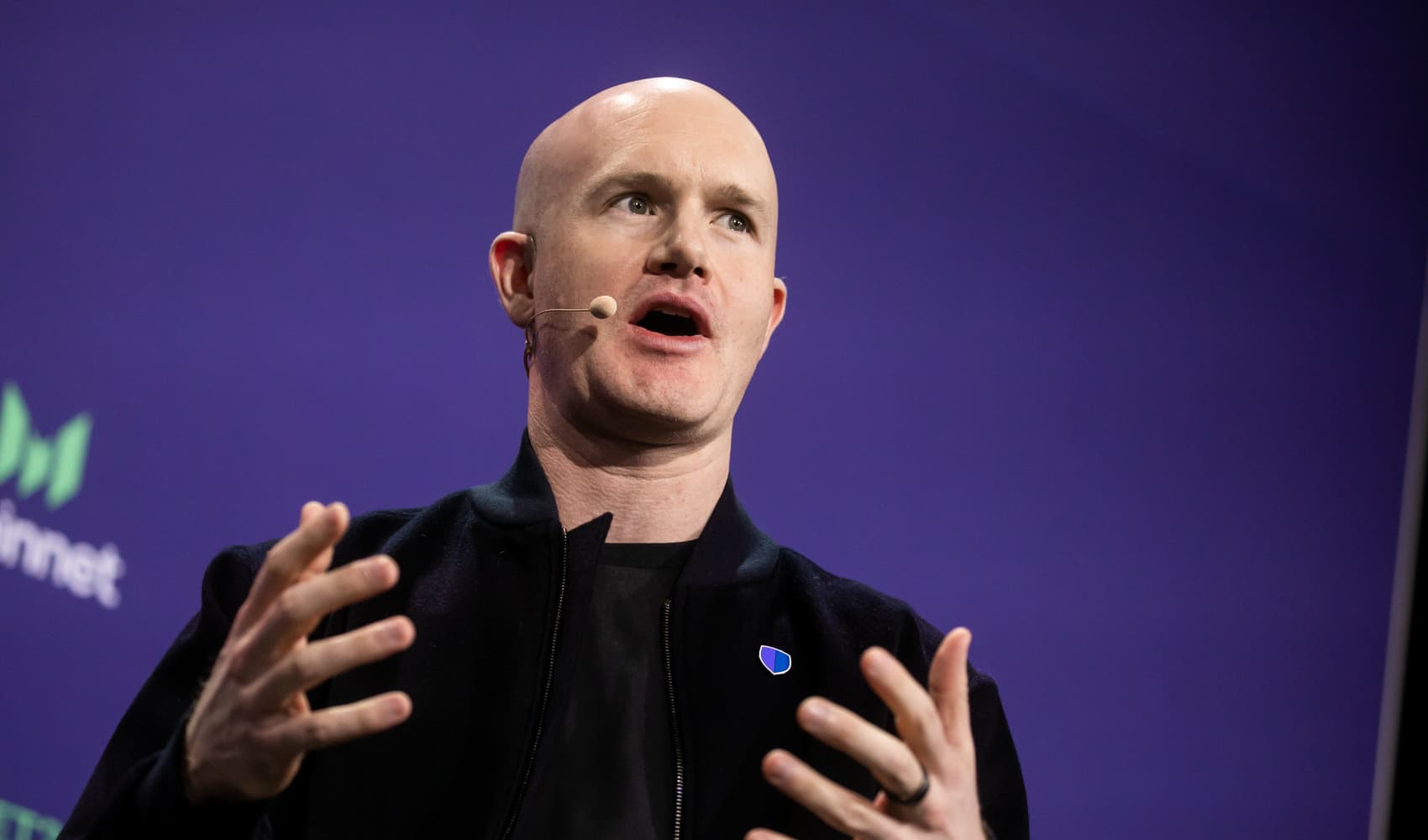Coinbase to Dominate Finance in 10 Years: How?
Coinbase's Audacious Vision: Global Financial Domination in a Decade
Introduction: Betting Big on the Future of Finance
Coinbase, the crypto giant, isn't just playing the game; they're aiming to redefine it. CEO Brian Armstrong recently articulated a bold vision: Coinbase wants to become the world's No. 1 financial service app within the next 10 years. That's a massive claim, right? But is it just ambitious talk, or is there a solid strategy behind this audacious goal? Let's dive deep into what it would take for Coinbase to achieve this, the challenges they face, and what it could mean for the future of finance for all of us.
The Crypto Landscape: A Rollercoaster Ride
Before we dissect Coinbase's plans, it's crucial to acknowledge the volatile nature of the crypto market. One day Bitcoin's soaring, the next it's plummeting. Regulatory hurdles, security concerns, and fluctuating public perception all contribute to the uncertainty. Imagine building a skyscraper on shifting sands – that's the challenge Coinbase faces. But perhaps Armstrong and his team see the potential of those shifting sands and know how to solidify them into something more stable.
The Volatility Factor
Crypto's inherent volatility is a major hurdle. Can Coinbase insulate itself and its users from these market swings? Perhaps through offering more stablecoin products or hedging instruments? Managing risk and educating users about responsible investing will be paramount.
The Regulatory Maze
Navigating the patchwork of regulations across different countries is another significant challenge. What's legal and accepted in one jurisdiction might be frowned upon, or even outright banned, in another. Coinbase needs to be agile and adaptable to navigate this complex landscape.
Coinbase's Strategy: More Than Just Crypto
So, how does Coinbase plan to transcend its current identity as a crypto exchange and become a global financial superpower? The key, it seems, lies in expanding its offerings beyond just buying and selling digital assets. Think of it like Amazon, which started as an online bookstore but now offers pretty much everything.
Diversifying Product Offerings
Coinbase is exploring various avenues, including:
- Offering traditional financial services: Think checking accounts, savings accounts, and even loans.
- Expanding into non-crypto assets: Could we see Coinbase offering stocks, bonds, or even real estate investments in the future?
- Integrating with Web3 applications: Seamless access to decentralized finance (DeFi) platforms and other Web3 innovations.
Focusing on User Experience
A seamless and user-friendly experience is crucial for mass adoption. Coinbase needs to make complex financial products easy to understand and use, even for beginners. Imagine a platform that simplifies complex financial concepts like DeFi with intuitive interfaces.
Global Expansion: A Worldwide Ambition
Becoming the No. 1 financial app means reaching a global audience. Coinbase needs to overcome cultural and language barriers to effectively serve users in diverse markets. Localization and partnerships will be key.
The Competition: A Crowded Battlefield
Coinbase isn't the only player vying for the top spot. Traditional financial institutions, fintech startups, and other crypto platforms are all competing for market share. Think of it like a crowded battlefield where only the strongest and most adaptable will survive.
Traditional Finance Giants
Established banks like JPMorgan Chase and Bank of America have deep pockets and a loyal customer base. They're also starting to embrace crypto and blockchain technology. Can Coinbase compete with these behemoths?
Fintech Disruptors
Companies like PayPal, Square, and Robinhood are already offering a wide range of financial services. They're agile, innovative, and have a strong focus on user experience. Coinbase needs to stay ahead of the curve to maintain its competitive edge.
Other Crypto Exchanges
Binance, Kraken, and other crypto exchanges are also vying for global dominance. They offer similar services to Coinbase, and often at lower fees. Coinbase needs to differentiate itself through superior technology, security, and customer service.
Regulation: The Unpredictable Wildcard
As mentioned earlier, regulation is a major factor that could either hinder or help Coinbase's ambitions. Clear and consistent regulations could provide a stable environment for growth. But harsh or restrictive regulations could stifle innovation and push businesses to other jurisdictions. It's like navigating a minefield; one wrong step could be catastrophic.
The US Regulatory Landscape
The regulatory environment in the United States is particularly uncertain. Different agencies have different views on crypto, and there's a lack of clear guidance. Coinbase needs to work with regulators to shape a favorable regulatory framework.
International Regulations
The regulatory landscape varies significantly across different countries. Coinbase needs to adapt its operations to comply with local regulations in each market it operates in. This requires significant resources and expertise.
The Technology Factor: Innovation is Key
To achieve its ambitious goals, Coinbase needs to continue innovating and developing cutting-edge technology. This includes:
- Improving security: Protecting users' funds and data from hacks and fraud is paramount.
- Scaling infrastructure: Handling a growing number of users and transactions efficiently.
- Developing new products and services: Staying ahead of the curve with innovative financial solutions.
Web3 Integration
Coinbase needs to seamlessly integrate with Web3 technologies, such as DeFi protocols, NFTs, and DAOs. This will allow users to access a wider range of financial opportunities.
Security Measures
Security is paramount in the world of crypto. Coinbase must invest heavily in robust security measures to protect user funds and data from cyberattacks. This includes multi-factor authentication, cold storage, and regular security audits.
The User Experience: Making Finance Easy
A positive user experience is essential for attracting and retaining customers. Coinbase needs to make its platform easy to use, even for beginners. This includes:
- Intuitive interface: A clean and user-friendly design.
- Educational resources: Helping users understand complex financial concepts.
- Excellent customer support: Providing timely and helpful assistance.
Mobile-First Approach
In today's mobile-centric world, a seamless mobile experience is crucial. Coinbase needs to ensure that its app is easy to use and provides access to all the same features as its website.
Personalized Experience
Tailoring the user experience to individual needs and preferences can increase engagement and satisfaction. Coinbase could use data to personalize recommendations and provide relevant information.
The Marketing and Branding Challenge
Coinbase needs to build a strong brand that resonates with a global audience. This requires a comprehensive marketing strategy that includes:
- Raising awareness: Educating the public about crypto and Coinbase's services.
- Building trust: Establishing a reputation for security, reliability, and transparency.
- Attracting new users: Compelling offers and incentives to sign up.
Building Trust
Trust is crucial in the financial industry. Coinbase needs to be transparent and honest in its communications, and demonstrate a commitment to protecting user funds. Building trust can be achieved through regular security audits, clear terms of service, and responsive customer support.
Community Engagement
Building a strong community around the Coinbase brand can help foster loyalty and advocacy. This can be achieved through social media engagement, online forums, and in-person events.
The Talent Acquisition Battle
To achieve its ambitious goals, Coinbase needs to attract and retain top talent. This includes:
- Engineers: Building and maintaining the platform.
- Financial experts: Developing new financial products and services.
- Marketing professionals: Promoting the Coinbase brand and attracting new users.
Competitive Compensation
Attracting top talent requires offering competitive compensation and benefits packages. This includes salaries, stock options, and other perks.
Company Culture
A positive and inclusive company culture can help attract and retain employees. This includes opportunities for growth and development, a supportive work environment, and a sense of purpose.
Financial Resources: Fueling the Dream
Achieving its ambitious goals will require significant financial resources. Coinbase needs to continue generating revenue and raising capital to fund its growth initiatives.
Revenue Generation
Coinbase generates revenue primarily through transaction fees. However, it also needs to diversify its revenue streams by offering new products and services.
Investment and Funding
Coinbase may need to raise additional capital through venture capital or public offerings to fund its growth initiatives.
Potential Roadblocks: Obstacles to Overcome
Coinbase faces several potential roadblocks on its path to becoming the No. 1 financial app. These include:
- Economic downturn: A recession could negatively impact the crypto market and Coinbase's business.
- Security breaches: A major security breach could damage Coinbase's reputation and erode user trust.
- Regulatory crackdowns: Harsh regulations could stifle innovation and limit Coinbase's growth.
Economic Instability
The global economy is currently facing significant challenges, including inflation, rising interest rates, and geopolitical instability. These factors could negatively impact the crypto market and Coinbase's business.
Cybersecurity Threats
Cybersecurity threats are a constant concern for crypto exchanges. A successful cyberattack could result in the loss of user funds and damage to Coinbase's reputation. It is a never-ending battle against those trying to take advantage.
The Future of Finance: A Glimpse into Tomorrow
If Coinbase succeeds in its mission, it could revolutionize the financial industry. Imagine a world where:
- Financial services are accessible to everyone: Regardless of their location or income level.
- Transactions are fast, cheap, and secure: Eliminating intermediaries and reducing costs.
- Users have more control over their finances: Empowering individuals to manage their own money.
Financial Inclusion
One of the biggest potential benefits of crypto and blockchain technology is financial inclusion. Coinbase could play a key role in bringing financial services to underserved populations around the world.
Decentralized Finance (DeFi)
DeFi offers a new paradigm for financial services, one that is more transparent, efficient, and accessible. Coinbase could become a major player in the DeFi space by offering users easy access to DeFi protocols.
Conclusion: A Long and Winding Road
Coinbase's ambition to become the world's No. 1 financial app in 10 years is a bold and audacious goal. Achieving this will require overcoming numerous challenges, including navigating regulatory uncertainty, competing with established players, and constantly innovating. However, if Coinbase can execute its strategy effectively, it could revolutionize the financial industry and bring the benefits of crypto and blockchain technology to a global audience. The road ahead will be long and winding, but the potential rewards are immense.
Frequently Asked Questions
- What are the main challenges Coinbase faces in becoming the No. 1 financial app?
Coinbase faces challenges including intense competition, navigating complex regulations worldwide, ensuring robust security, and effectively expanding its services beyond cryptocurrency to encompass traditional finance.
- How is Coinbase planning to diversify its product offerings?
Coinbase aims to diversify by offering traditional financial services like checking and savings accounts, exploring non-crypto asset investments, and integrating with Web3 applications like DeFi platforms.
- What makes Coinbase's user experience strategy important for its success?
A user-friendly experience is vital because it simplifies complex financial products, making them accessible to a wider audience, including those who are new to finance and cryptocurrency.
- How is Coinbase addressing regulatory concerns to expand globally?
Coinbase is working on regulatory compliance by adapting its operations to meet local requirements in different markets, collaborating with regulators, and advocating for clear crypto regulations.
- What are some potential roadblocks that could hinder Coinbase's progress?
Potential roadblocks include economic downturns affecting the crypto market, security breaches damaging user trust, and regulatory crackdowns limiting growth and innovation.

